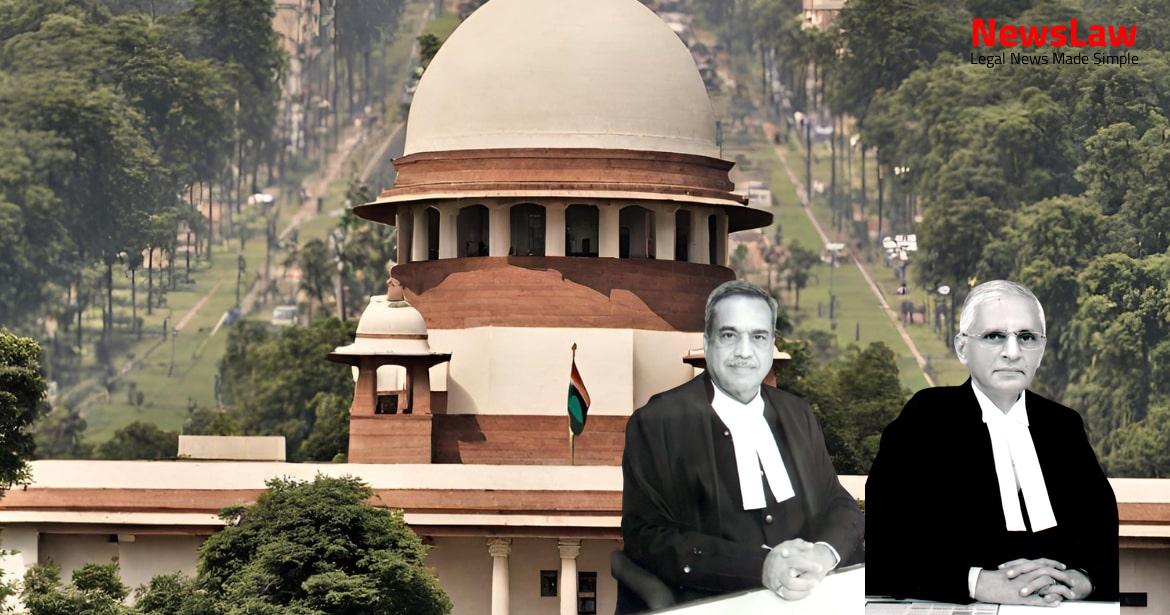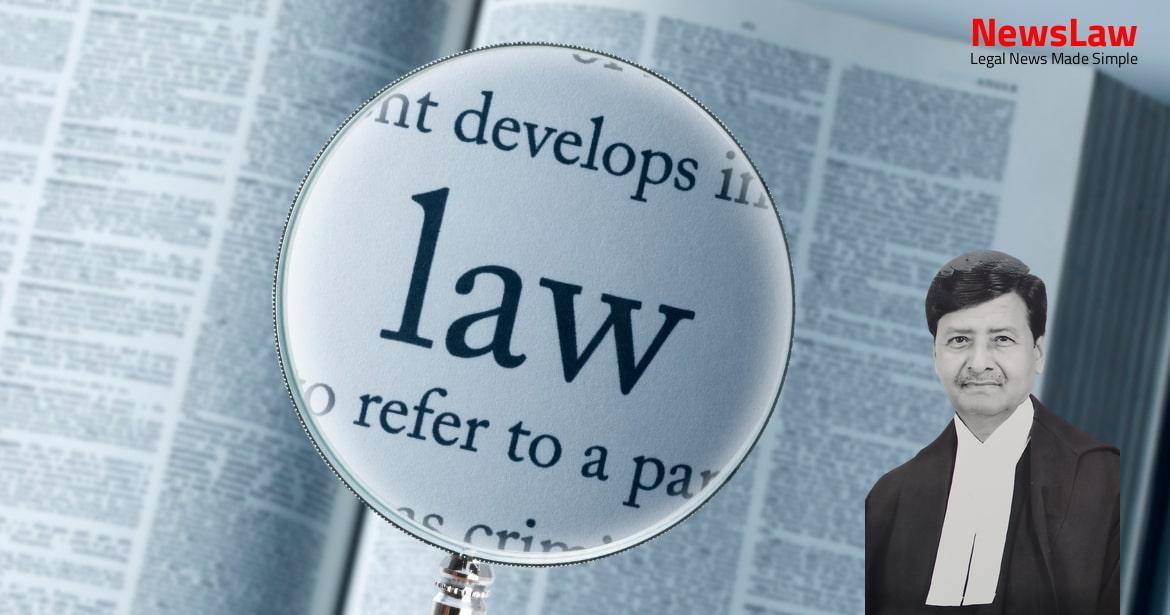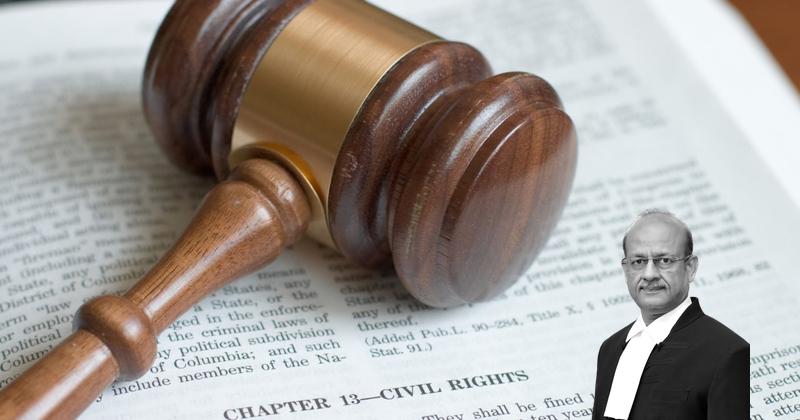This legal case delves into the intricate analysis conducted by the court regarding the break in service for pension entitlement. By examining relevant government orders and rules, the court navigates the complexities of service continuity in public sector employment. Stay tuned to uncover the insights provided by the court’s legal analysis in this significant case.
Facts
- The appellant joined the Technical Education Department on 31.05.1987 through the Public Service Commission.
- The appellant filed a representation on 23.09.2006 to condone the break in service which was rejected by an unreasoned order on 12.02.2007.
- The appellant claimed pensionary benefits considering the 10 years of service in the Telecom Department (Central Government) from 05.02.1974 to 31.05.1984.
- A review petition dated 17.09.2014 was filed by the appellant requesting the State Government to review the decision regarding pensionary benefits due to employment in a State-owned PSU ‘SILK’.
- The review petition was rejected despite a government order dated 24.09.2014.
- The appellant worked in the Telecom Department as a Technician from 05.02.1974 to 31.05.1984, then joined SILK as an Engineer from 04.06.1984 to 31.05.1987.
- The Kerala Administrative Tribunal (KAT) analyzed relevant rules and government orders, determining the appellant’s entitlement to pensionary benefits.
- The KAT set aside the earlier decision, allowing the appellant to receive the benefits after serving for about 19 years and retiring on 30.06.2006.
- The appellant’s request for reckoning Central Service as qualifying for pension was subject to condonation by the State Government due to a break in service of nearly three years.
- Appellant’s request for condoning the break in service was declined by the Central Government.
- The requirement was to condone the period of service in ‘SILK’ as a disconnect period for continuity of service.
- Benefit of Government order dated 24.09.2014 was upheld for the appellant’s entitlement.
- Break between two appointments should not exceed the joining time allowed under service rules.
- High Court declined relief assuming the appellant was seeking to reckon ‘SILK’ service as pensionable.
- High Court set aside KAT’s order allowing pension benefit by condoning break in service without addressing the real issue.
- Order dated 21.05.2019 passed by the Division Bench allowed the petition and reversed KAT’s decision in favor of the appellant.
Also Read: Supreme Court Upholds Rejection of Plaint Under Order VII Rule 11 of CPC: A Critical Analysis
Arguments
- Appellant’s claim is to consider service between specific dates as pensionable service.
- Appellant excludes service between certain dates.
- State Government rejected the claim based on Rule 29, Part III KSR.
- Rule states that past service benefit is forfeited if break between appointments exceeds joining time.
- Appellant files appeal stating to be aggrieved by the rejection of the claim.
Also Read: Validity of Debt and Enforcement of Section 138 NI Act
Analysis
- Government Orders dated 12.11.2002 and 06.12.2003 are crucial in determining the condonability of the break in service for the appellant.
- The appellant had pensionable service in the Telecom Department from 05.02.1974 to 31.05.1984.
- The Government Order dated 12.11.2002 addresses employees who left former service in Central Government for appointments in State government departments.
- The Government Order dated 06.12.2003 modifies the pension liability concerning service rendered under Central Government and State Government, eliminating the need for proportionate sharing of pensionary benefits.
- The appellant’s non-pensionable employment in ‘SILK’ from 04.06.1984 to 30.05.1987 is deemed break in services for pensionable periods.
- Rule 29(b) of KSR stipulates the conditions under which a break in service can be condoned.
- The appellant’s request is to have the break in service between Telecom Department and Technical Education Department condoned without including the ‘SILK’ service.
- The availability of provisions to condone the break in service needs to be examined based on the relevant government orders.
- Rule 29 Part III KSR 29 states that resignation or dismissal from public service leads to forfeiture of past service.
- Resignation from one appointment to take up another where service counts is not considered resignation from public service.
- Government reserves the power to deal with cases of persons serving in civil capacity under the Government in a just and equitable manner.
- The case shall not be handled in a manner less favorable than what is provided by relevant rules or orders.
- The issue of the appellant’s retirement date had not been settled when the Government Order was issued.
- The Government Order dated 24.09.2014 took note of requests to reckon prior qualifying service.
- The benefit of reckoning service in Central Government for pensionary benefits was given when the appellant was still in State Government service and had not retired.
- The issue of condoning the break in service was raised immediately upon retirement and was still being pursued.
- The review petition against the order dated 25.07.2014 was rejected on 21.05.2015 only after the Government Order granting the benefit was issued.
Also Read: Enlargement on Bail in Illegal Mining Case
Decision
- Order dated 14.11.2016 in O.A. No 975 of 2015 restored for implementation
- Government Order dated 24.09.2014 states forfeiture of past service upon resignation, dismissal, or removal
- Appeal allowed with no costs, pending applications disposed of
- High Court order dated 21.05.2019 in O.P. (KAT) No.468 of 2017 set aside
- Implementation timeline from the said order applies from this day
Case Title: VALSAN P. Vs. THE STATE OF KERALA (2021 INSC 656)
Case Number: C.A. No.-006292-006292 / 2021



